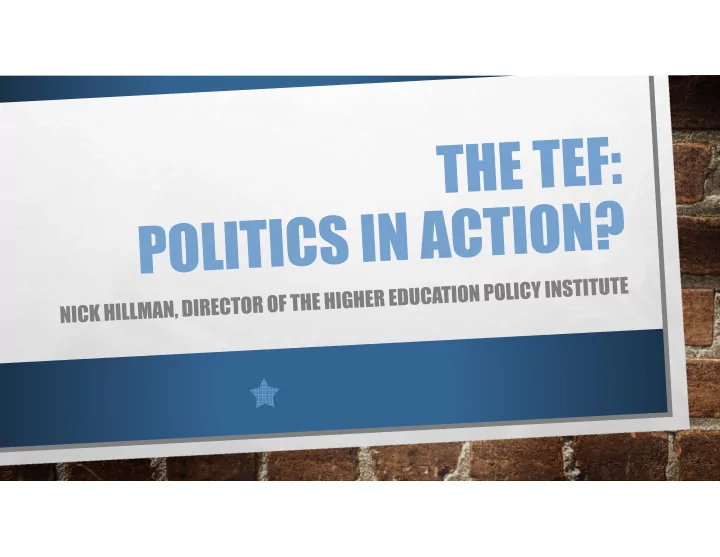

HEPI: 15 PUBLICATIONS IN 2015
HEPI: 15 PUBLICATIONS IN 2015
HEPI: 15 PUBLICATIONS IN 2015
HEPI: 15 PUBLICATIONS IN 2015
HEPI: 15 PUBLICATIONS IN 2015
MANCHESTER: SO MUCH TO ANSWER FOR
BUT MANCHESTER NOT (MAINLY) TO BLAME
THINGS IMPROVED – TO A DEGREE
2010 PROMISES: CAKE AND EAT IT • Students were told: • “Don’t change behaviour / it’s not real debt” • Universities were told: • “Prepare for a wave of unprecedented consumer power” • Both were half true
PART-TIME STUDENT NUMBERS
WHAT DO I GET? Edward Acton (former Vice-Chancellor of the University of East Anglia): “Before the Browne Review of Student Finance was launched in 2009, the University of East Anglia had begun a strategic drive to intensify undergraduate study. The centrepiece was heavy investment in additional high-quality academic appointments. Since fees were raised to £9,000 in 2012, that has remained a top priority. As a result, the staff:student ratio has fallen … and there has been a dramatic increase in academic time devoted to education.”
WHO WORKS HARDER: HOME OR INT?
ORIGINS OF THE TEF • Tory manifesto 2015: “we will introduce a framework to recognise universities offering the highest teaching quality” • Jo Johnson, July 2015: “That is why my priority as Universities Minister will be to make sure students get the teaching they deserve and employers get graduates with the skills they need by introducing the Teaching Excellence Framework” • Green paper, November 2015: “a Teaching Excellence Framework will deliver better value for money for students, employers and taxpayers.”
“NOT BIG, BOSSY OR BUREAUCRATIC?”
HEPI ANNUAL LECTURE, 1 DECEMBER 2015
BACK TO 1880? • 1880: Victoria University founded as a federal institution to be the examining university for the north and to rival the degree-awarding University of London down south. • For a while, affiliates included Owens College in Manchester, University College Liverpool and Yorkshire College in Leeds (three founding members of the Russell Group). UCL considered joining. • There are no wholly new questions in education policy. In one sense, the green paper reverts to 1880: • “With new legislation, Government could give DAPs to non-teaching bodies, with no incumbency interest, in order to widen options for validation.”
Recommend
More recommend